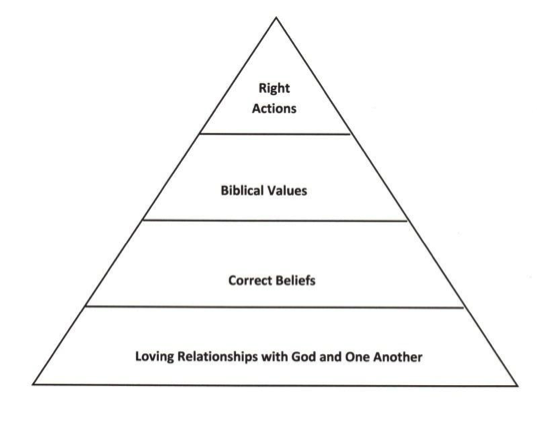 Not long ago, I (Josh) was speaking at a large church in the Midwest. The church had just completed a building project and moved into their large facility. As I approached the entrance, I noticed a huge banner hanging across the building. It read, “We preach the truth—and the truth only!”
Not long ago, I (Josh) was speaking at a large church in the Midwest. The church had just completed a building project and moved into their large facility. As I approached the entrance, I noticed a huge banner hanging across the building. It read, “We preach the truth—and the truth only!”
Now of course we are to teach our kids God’s truth—that’s how they adopt correct beliefs and form a biblical worldview. But I’ve heard enough similar statements to be suspicious when people talk about the “truth only.”
My first thought on seeing the banner was, if the sign means what I suspect it means, this church is doomed to failure.
A lot of parents are caught in this same trap. They think they have gone deep enough if they can get their kids to believe God’s truth, because then they will hold the right values and do the right things. But this approach is doomed to failure because it is missing the key ingredient that makes God’s truth come alive and transform a person’s life. And that key is relationship!
King David said, “Declare me innocent, O Lord, for I have acted with integrity…I have lived according to your truth” (Psalm 26:1, 3). When we isolate verse 1 and the latter part of verse 3, as we have done here, we overlook the very context that truth is to live within. Let’s read the whole of verse 3.
For I am always aware of your unfailing love and I have lived according to your truth. (Psalm 26:3)
David was constantly aware of the unfailing love and the relational connection to his God. He saw God’s truth within the context of relationships. He would later pray “Teach me your ways, O Lord, that I may live according to your truth” (Psalm 86:11). David saw a direct relationship between knowing God and His ways and living out God’s truth. He had discovered that his right living was empowered by God’s unfailing love toward him.
The apostle John discovered that power as well when he said, “We love each other as a result of his loving us first” (1 John 4:19, NLT).
It’s true, as we have stated before, that beliefs shape our values and values drive our actions. Yet the reality is that we all interpret what we believe about God, ourselves, and all of life through our relationship experiences.
King David had it right—correct actions come out of embracing God’s truth (beliefs and values), but it was all powered by the unfailing love of God (relationship).
All that your young people have learned and everything they know, even how they learned it, has come out of a relationship with someone or something. We don’t often think of it that way, but much of what each of us are today is a direct result of who we are related to and how. And it is out of these relationships that we establish our beliefs—our worldview. Loving relationships are the fertile ground in which your young people’s beliefs grow that shape their values that drive their actions. Living according to God’s truth then is found in the power of love (see chart).

Why are relationships so important to developing right beliefs, values, and actions? Because we were created that way. The relational God of the universe planted deep within each of us an identifying market or distinguishing characteristic of His own likeness – and that was the capacity for loving relationships. We know that from Scripture (Genesis 1:26-27). And recently medical science has confirmed that truth.
A number of years ago Dartmouth Medical School commissioned a scientific study of young people. The project, which was called Hardwired to Connect, analyzed the results of more than 260 studies of youth. The report stated that 100 percent of all the studies they analyzed showed that from the moment a baby is born, his or her brain is physically, biologically, and chemically hardwired to connect with others in relationships.**
This is why highly respected Dr. Allan Schore of the UCLA School of Medicine said, “We are born to form attachments. Our brains are physically wired to develop in tandem with another through emotional communication before words are spoken.”*** That shouldn’t surprise us, since we were created in the image of a relational God. Yet far too often we convey rules and truth apart from loving relationships. We, like our pastor friend, “preach the truth and the truth only.”
In Ephesians, the apostle Paul said to “speak the truth in love” (Ephesians 4:15). Truth is always designed to be taught within the context of a loving relationship. Paul said, “We loved you so much that we shared with you not only God’s Good News but our own lives, too” (1 Thessalonians 2:8). Paul wasn’t promoting a “truth only” approach; he was teaching within the context of a living relationship with those he loved. And that is when the truth took root and people’s actions changed. That’s the power of love.
In fact, without healthy relationships, all attempts to instill beliefs, values, and right actions will be ineffective because they are detached from the necessary elements of personal love and care. It is that love and care that God uses to help a person make right moral choices. That is why truth without relationships most often leads to rejection, and discipline or rules without relationships often leads to anger and resentment. But when you place truth within the context of loving relationships, you almost always get a positive response. Why was King David living according to God’s truth? Because he was constantly aware of his Heavenly Father’s “unfailing love”
– Truth within the context of loving relationships.
- Bonus Chapter from Straight Talk with your kids about sex
- ** “Hardwired to Connect: The Scientific Case for Authoritative Communications,” The Commission on Children at Risk, 2003.
- *** (Endnote provided by Josh)



